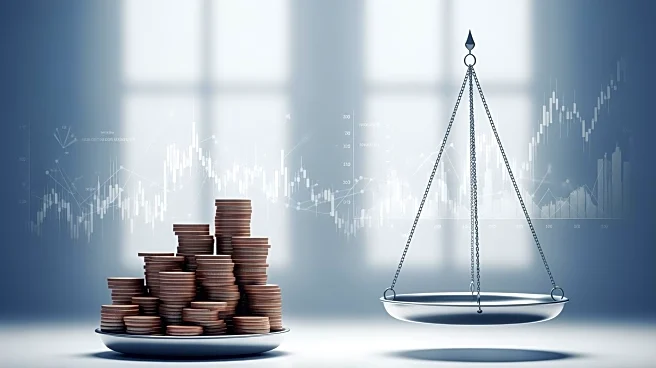What's Happening?
Recent third-quarter earnings reports from various consumer companies are highlighting a growing economic divide in the United States, often referred to as a 'K-shaped' economy. This trend is characterized by wealthier Americans increasing their spending,
while lower-income individuals are cutting back due to rising inflation and essential costs. The Consumer Price Index recently reported a 0.3% monthly increase, bringing the annual inflation rate to 3%. In response, the Federal Reserve has implemented its second consecutive interest rate cut, adjusting the overnight borrowing rate to a range of 3.75% to 4%. The ongoing government shutdown, now in its fifth week, is exacerbating financial strain for many federal workers. The Census Bureau's latest data indicates that 35.9 million people were living in poverty in 2024, with the median household income at $83,730. The top 10% of earners saw a 4.2% income increase, while the bottom 10% experienced no significant change.
Why It's Important?
The emerging economic divide has significant implications for U.S. industries and consumer behavior. Companies like Chipotle and Coca-Cola are witnessing shifts in spending patterns, with lower-income consumers reducing their purchases due to economic concerns. This bifurcation could lead to strategic adjustments in business models, such as McDonald's expansion of its value menu to cater to a 'two-tier economy.' The disparity in spending power is also reflected in stock market gains and rising home values, benefiting higher-income households. As companies prepare to release further earnings reports, the persistence of this trend could influence future economic policies and corporate strategies.
What's Next?
As more companies release their quarterly earnings, the continuation of the K-shaped economic trend will be closely monitored. Businesses may need to adapt their offerings to address the divergent spending behaviors of different income groups. Policymakers might also consider additional measures to mitigate the impact of inflation on lower-income households. The Federal Reserve's interest rate decisions will remain a focal point, as they attempt to balance economic growth with inflation control. The outcome of the government shutdown could further influence economic conditions and consumer confidence.
Beyond the Headlines
The K-shaped economy raises ethical and social questions about income inequality and economic justice. The growing divide may lead to increased calls for policy interventions aimed at reducing disparities and supporting vulnerable populations. Long-term, this trend could reshape consumer markets and influence cultural attitudes towards wealth and consumption.















